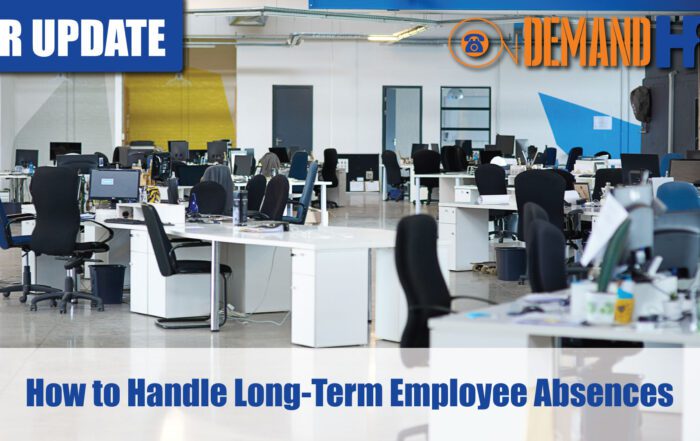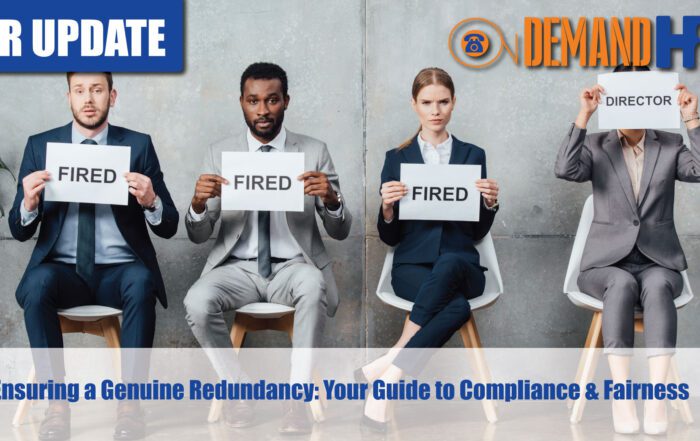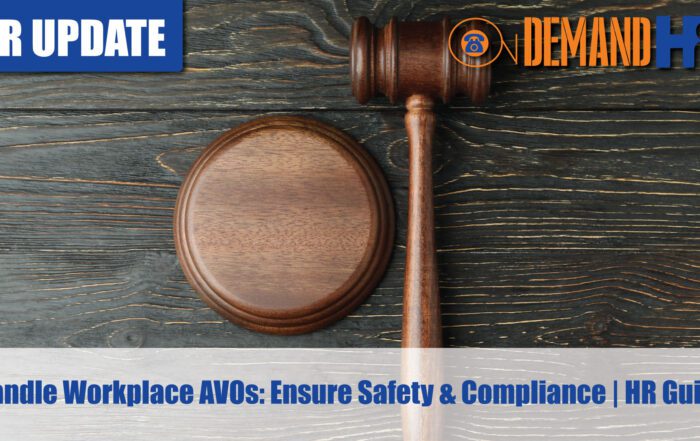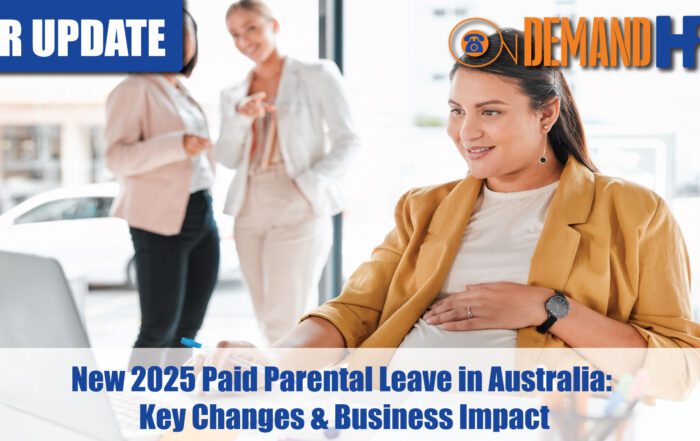External HR Consultants for SME’s
In episode 12 of HR Fridays Clint will be unpacking why SME’s should engage an external HR consultant. He will also be sharing what your business should be looking for as well some things to avoid.
Please see below for a full transcript of the video
Share the HR or workplace relations challenge facing your business and one of our experienced consultants will be in touch within 24 hours with a strategic action plan or discover the best strategy yourself by accessing out free online training library.
Transcript
0:16
Good morning, everyone. Welcome to another edition of HR Fridays with On Demand HR. My name is Clint Indrele, Managing Director. And today we’re going to present yet another HR topic, as we do every Friday here at 11:30. Please let us know any future topics of interest. If you’re watching live or watching this video afterwards, please ask any questions in the comments box and we’ll be happy to respond to you in a timely manner.
The whole purpose of HR Fridays for those who watch us every week is we’re trying to provide businesses, other organizations and our professional advisors and associate members with advice which is reality. We’ve been in the Fair Work Commission many times we’ve done many workplace investigations, we’ve dealt with the Fair Work Ombudsman and other employment bodies. And this allows us to provide real perspective, not just theory, and not scare tactics in any way. So www.ondemandhr.com.au.
Today’s topic, we’re going to look at outsourced HR. So making decisions about external HR consulting more generally. And we’re going to talk about some things that we think are quite important in looking at or making decisions about outsourced HR. This is something that is often on the mind of a lot of small to medium businesses, they’re thinking about how to deal with these issues of HR, how they manage those things professionally. So let’s get into it right away.
So first of all, who is likely to require outsourced HR consulting, so look any small or medium business effectively, but typically businesses within that kind of 20 to 100 employees, and pretty much in any industry. So once you start getting at least 20 employees, you are large enough to have regular HR requirements relating to a range of things. So first of all, when you’ve got new employees coming on board, how are contracts being drafted? Are they receiving policy documents? Are they receiving training, induction, those sorts of things. So that’s the first aspect of it. With a business of 20 to 100 employees, you’re regularly going to have recruitment requirements, often people are finding, you know, agencies are ineffective, expensive. And doing it themselves is often very difficult as well. So that is also another thing that can be a key requirement or key need to look at outsourced HR consulting. And I don’t really see recruitment and HR consulting as necessarily separate, I see it as you know, all one of the same bucket, essentially, we also look at performance management. So when I talk about performance management, we talk about proactive and reactive. Some organizations are really good with the proactive stuff, they have a regular performance review, they have a structure around how those performance appraisals happen. Others not so much others will simply deal with it on a reactive basis, if someone does something wrong, issuing a warning, issuing a performance improvement notice and going through a disciplinary process with that particular person. So yeah, performance measure, it can be a combination of proactive and reactive. And it just depends on your organization, you know what type of work you do, and how serious you are about managing the performance of your employees. But irrespective of which method you choose, there’s always going to be a need for one or both of those particular things. The other thing that organizations that are small to medium are likely to come across is the occasional tribunal matters. Inevitably, people are terminated from employment from time to time, there’s going to be issues with respect to, you know, the Fair Work Commission, unfair dismissals, general protections claims, it could be anti-bullying claims, you could have issues with, you know, Work Cover, The Fair Work Ombudsman, so these are all sorts of tribunal, you know, employment, body matters that can come up for a small to medium business. And again, not having anyone effective to deal with those things can be a problem. So there’s a number of other things that can also fall into that bucket as well. And we’ll talk about that, you know, later in the presentation. But there’s typically some key things that a small to medium business might be thinking about subject to HR consulting, and why that might need outsourced HR consulting in the first place. The other thing that we find typically with these businesses between 20 and 100 staff is that they’re not in a position to afford a HR manager or an employment relations manager between that sort of 100 to 150K mark, and look, even if you do have the position to afford someone like that, they’re not necessarily going to be effective. And we’re going to talk a little bit about where we see some quite ineffective, you know, HR or ER managers and, you know, particularly in an outsourced context, what type of person you should be looking for. So, we’ll move on to the next part of it.
We want to sort of really talk you through today what we think is a good I guess, outsourced HR model. Obviously, you know, you’re entitled to form your own view on these things, but want to give you something to think about in terms of what types of things an outsourced HR consulting function should look like. So first and foremost, I think it’s very important to understand that there is, you know, an initial compliance review of your affairs. So understanding what modern awards cover my business, what classification levels apply to those modern awards for my employees? And what’s the minimum I’ve got to pay everyone for the positions that they’re in? Then we look at the salary structures, wages, structures and incentive structures, do I have bonus schemes? am I paying overtime or not? Am I having salaries with exemptions or not, that all feeds into the employment contracts part. And structuring the employment contracts appropriate to whatever structures are decided and whatever structures are required under the Modern Award. The other part of it that should also be looked at is your workplace policies and procedures. And I would say this to many organizations, sometimes organizations to get stuck with, you know, HR managers, or HR consultants that drag this policy work on for a long period of time. And quite frankly, it’s not a task that takes that long, there are a core probably 20 key policies that you needed an SME, they should all be in simple, plain English, very easy to understand for employees, what you don’t want to be doing is spending months and months and months of fees on an external HR consultant or even an internal HR manager rewriting policies for for weeks and months on end, that’s certainly something to be looking out for as a red flag. In terms of other types of things that you might look at in in a compliance review. Obviously, you know, rewriting those contracts, rewriting those policies, so that they are fit for purpose for your employees. So that’s kind of what we refer to as an initial compliance review.
Another part of what we think is very important in a HR consulting service, if you like, is providing day to day Workplace Relations support. So this could be things like, you know, assisting with employment, performance appraisals, written warnings, other disciplinary action for misconduct, as required, giving advice on modern award requirements on rostering requirements, payroll and salary review advice. Whilst it’s important to understand what the minimums are, it’s also understand also, understanding of what the market is paying for particular roles is also very important and should form part of a outsourced HR consulting function. You should also be able to seek advice in respect to termination of employment, including the unfair dismissal and other tribunal risks. So it’s no point advising on termination of employment unless you clearly understand what the risks are, under the Fair Work Act, what section 387 says and how you should deal with that in terms of conducting a termination. Providing new employment contracts to new and existing employees as required, that should be another key function of an outsourced HR resource, being able to, you know, deliver on those things in a timely manner, dealing with employee grievances for complaints in respect to bullying, harassment, discrimination, do they require investigation or not, and really being able to give some good solid advice and assessment on those things, managing workers comp claims and return to work is also very important. And just giving general guidance on the National Employment Standards, the Fair Work Act, and things like leave entitlements, annual leave sick leave long service leave and other leave, as outlined in the NES. So that’s a, that’s a bit about, I guess, the usual day to day support that an external HR function should provide to a business essentially. So some good pointers there for you to think about consider.
Another key thing that we think is critical to an organization’s external HR function and something that is often not delivered by organizations who do this is conducting a quarterly review. So really looking at not only just, you know, providing advice when you get a phone call, but actually sitting down with the organization or over a Zoom conference and having a structured review, where you look at, you know, the current organizational structure, is it effective does it work, should we be making changes to the structure, should we be restructuring it to make it more efficient, giving updates on key Workplace Relations developments, there are often things that, you know, just take 2020, for example, we’ve had annualised salary provisions that have come into modern awards in March, we’ve had a jobkeeper provisions throughout the year and section 789 provisions that relate to those. And there’s been a number of other developments around casual employment and those sorts of things that are very important to keep your clients up to date with. So that’s a key function as well, in those review meetings, discuss the current business performance, performance of staff, and obviously any changes to contractual or payment arrangements that the business would like to introduce. Looking at, you know, reviewing all current workers comp claims, where are they up to? What’s the strategy for bringing that to the best possible business outcome or commercial outcome that is available, discussing, you know, casual subcontractors looking at risks looking at long term casual subcontractors looking at, you know, should they be converted or not? And talking about, you know, how those things might occur? If there’s Modern Award provisions, do we offer conversion formally? And those types of decisions as well, looking at high performing and poor performing employees, so our poor performing employees, what are we going to do to get them up to standard or get them out of the business? And with high performing employees? Well, how are we going to keep them what what is it that we’re going to do to incentivize this person to stay, just not having the attitude that Oh well, you know, this person will be fine, they will stay, we don’t need to do anything so important to look at both identify high performers, what we’re going to do with those and poor performers, what we’re going to do with those, often for a small business, it is that reactive, thinking about the poor performers and not thinking about the high performance enough so that’s a great idea for the review meetings to really look at those things. Also, managing leave balances giving advice on how to reduce liabilities, where appropriate, this has been really topical in 2020, around reducing long service leave annual leave, particularly while businesses have been functioning below their normal capacity, looking at any specific issues since your last review, and also talking about training and development initiatives for that particular business. And we’ll get into some of those things a little bit later on in the presentation.
So in terms of ongoing training, and development, so some of the things we think that are critical to an organization, particularly the top two, so workplace bullying, discrimination and sexual harassment, you should have something in place for those types of training requirements, On Demand HR, we actually provide a an online solution for that. The reason we provide an online solution is simply this, if you’ve got employees coming and going all the time, it’s not, you know, feasible for you to have a facilitator coming out every month or every second month, delivering training face to face. So an online module is, you know, a good way of dealing with this. If you’re ever asked a question by WorkSafe. Well, you know, what have you done in respect to this type of training for your employees, another type of training, we think is really important at the supervisor level and up is performance management training. So understanding what they’re doing with respect to written warnings, understanding how to conduct disciplinary meetings and performance management meetings, not just sort of leaving them to their own devices, and giving them just, you know, flying by the seat of their pants, so to speak. Termination and unfair dismissal is another good one, it kind of feeds into that performance management training. So by understanding how to conduct a good termination process, and understanding risks around unfair dismissal will also help you better perform in respect to performance management of your employees within the business, how to deal with complaints and investigations. That’s another training that can be offered. And certainly we offer to clients from time to time, and other topical HR / Workplace Relations, or other matters. I mean, this year, we’ve done a lot on JobKeeper for clients, giving them you know, training tools around those particular things, and so on. So again, really looking at some of those training modules, looking at opportunities to develop those employees. And those things are very important in a in an outsourced HR function. With on demand HR, specifically, we provide tribunal representation through our division On Demand Case Services. We also do workplace investigations through On Demand Case Services, and we provide a full recruitment campaign service through On Demand recruitment Services, should I say On Demand Recruitment Campaigns, that should not be confused with a placement service, which often agencies will use, we will often deliver what is what, we always deliver, should I say, What is an internally run campaign with a company branded ad, celebrating that company’s brand, being very clear about what the job is where it’s at, not these kind of, you know, comments, like our client, this in mysterious location that, you know, ambiguous information about the job, those things are, you know, whatever the recruitment agents say those things are purely self serving, those things are purely so that, you know, other agents don’t come in and want to pitch for the same work. A good campaign has a company branded ad, celebrating the benefits, celebrating the brand, clearly articulating the role, that is always a better strategy for recruitment. And again, the service we offer complements that internal, internally branded campaign, if you like
In closing today’s presentation, I guess we just want to give some final thoughts on you know, choosing external HR consulting. And look, we’re not saying you know, choose On Demand HR, these are some of the things that you should think about. First of all, watch out for long term contracts three to five years. I mean, you might not be satisfied with the service you’re getting from a HR consultant in a matter of months. If you’re not if you’re not satisfied with that service. The last thing you want to do is wait another two and a half years or four and a half years for that service to come to an end and there’s no justification for why any service that has any kind of, you know, backs it ability to deliver should be requesting you to enter into a contract of that length of time. So that’s the first thing I would say to, to look out for. The second thing to look out for is an insurance component. And we often find this is first of all unnecessary, and it’s in conflict with advice that’s given. So if you are going to get an employment practices insurance policy, I would suggest that you do it completely separately from any external HR consulting, you know, organization, because, you know, quite frankly, if the organization is giving the insurance policy, and they’re giving the advice, well, then clearly, they’re not going to want to trigger the insurance policy, which is going to, you know, deliver cost and, and, and, you know, a payment on on that end. And that’s going to lead to ultimately conservative advice, you know, don’t terminate this person, no matter what, because we don’t want to trigger the insurance component. And you’ve only got to look at the Fair Work Act and some of the outcomes that come out of or should I say the Fair Work Commission and some of the outcomes that come from unfair dismissals? I mean, I think the statistics are something like 70% of settlements, in the Fair Work Commission is $7,000 or less. So you got to ask yourself as well, what is it exactly? If I’m gonna get insurance? What am I insuring myself against? I mean, sure, there is the odd claim that the odd sort of, you know, one that’s outside of the standard deviation, that could be fairly significant. But, again, this insurance component is really, you know, for me, it’s overblown. And if you must have get a policy, get it separate from your, from your external HR consultants. The other thing I’d say to watch out for is, you know, Ex corporate HR consultants that don’t have any IR experience. Those might be great for big organizations, but not so great in small organizations, particularly when you’ve got a lot of IR based questions, how do we terminate this person? You know, how do we run this unfair dismissal conciliation, those sorts of things, often, often that style of HR consultant struggles in that environment. And we’ve seen that firsthand, in the past, look for consultants that have got some form of tribunal experience. So Fair Work Commission experience, in particular, these are situations that can cost your business money, and being able to, you know, get help from the external HR consultant on that can save you a lot of money in terms of legal fees, particularly on the unfair dismissal side of things, and look for consultants that aren’t afraid to take a position on issues instead of kind of sitting on the fence or not being sure of their convictions on particular issues, particularly around you know, stuff that you know, termination, unfair dismissal, General protections, those types of things. If you’re, if you’re not getting clear advice, or if you’re getting advice, which is not really helping you make a decision, well, then it’s not really offering a lot of value at all. So those are some thoughts, again, around offering these things just from client experiences, talking to many, many clients in many industries over the years, and things you should think about in making decisions on these matters.
So I just like to say once again, thanks very much for tuning in today to HR Fridays. Once again, my name is Clint Indrele, Managing Director of On Demand HR. Look forward to having you back here again next Friday. We’ve got two more sessions before the end of the year. I’ve got a really good one coming up. In particular, it’s going to be around some suggested industrial relations reforms going to be quite controversial in some comments that I’ll make about some changes that should be made just for the sake of giving people some real food for thought around what sort of things our system might need into the future. Once again, thanks very much for your participation. Have a great weekend.






